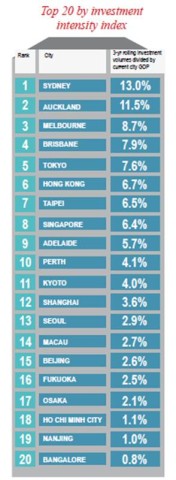 Figures in the top-20; far above bigger cities like New Delhi and Mumbai
Figures in the top-20; far above bigger cities like New Delhi and Mumbai
Anuj Puri, Chairman & Country Head, JLL India
Bengaluru has made its debut in yet another global survey by JLL. After figuring in the top-20 technology-rich cities globally earlier this year, Bengaluru has made it to JLL’s latest Asia-Pacific city investment intensity index. The index compares volume of direct real estate investment over a three-year period relative to the current economic size of a city.
While global cities like New York, London and Tokyo nearly always rank at the top in commercial real estate investment volumes by virtue of their sizes, the top five cities across Asia-Pacific region are Tokyo, Singapore, Seoul, Sydney and Hong Kong, ranked by three-year rolling direct real estate investment volumes ended 2Q15.
 Regional city rankings, however, change quite a bit once the size factor is accounted for. Within Asia Pacific, the latest Q2 2015 index sees Sydney and Auckland at the top two spots in terms of real estate investment relative to city size. Bengaluru is at No. 20. Tokyo, Hong Kong and Singapore still rank among the top ten but Seoul ranks lower (13th).
Regional city rankings, however, change quite a bit once the size factor is accounted for. Within Asia Pacific, the latest Q2 2015 index sees Sydney and Auckland at the top two spots in terms of real estate investment relative to city size. Bengaluru is at No. 20. Tokyo, Hong Kong and Singapore still rank among the top ten but Seoul ranks lower (13th).
More transparency is important
Due to lower market transparency, foreign investment into India is often through debt or at the entity level. Hong Kong, Singapore, Tokyo and Taipei still rank among the top ten with their transparency scores close behind (Korea sits further down), while the less transparent markets of China, India and emerging Southeast Asia are under-represented among the league. This provides opportunity for investors with local knowledge to find deals; the size of the cities’ GDP show there is capacity for real estate investment to increase.
Foreign investment interest in Bengaluru and other Indian cities may be underrepresented in the index as these figures reflect equity investments at the asset level. Directly, real estate investment is generally difficult for foreigners in India, and investors looking to take part in market growth may need to go through routes such as debt deals and joint ventures with local partners. The index advises investors to continue to seek core business park/ office investments in Bengaluru.
Interestingly, New Delhi and Mumbai also figure at No. 34 and No. 42 respectively in the index. The reason behind these two bigger cities figuring so low is because the index wants to highlight only those dynamic, mid-sized cities that are punching above their weight in terms of their attraction for investors.
New Delhi and Mumbai have enough investments coming in but their sheer size being far bigger than Bengaluru and the index being a ratio, they figure lower here. Bengaluru is a smaller city than the political and financial capitals of India and yet manages to attract a lot of investment in comparison of its size.
On an average, commercial real estate assets worth 10% of a city’s gross domestic product (GDP) change hands every three years. The index not only provides a measure of real estate market liquidity but also a useful barometer of a city’s overall attractiveness to investors. On top of considerations on returns, diversification benefits and factors such as real estate transparency level and the ease in cross-border purchases are increasingly being incorporated into investment strategies.
